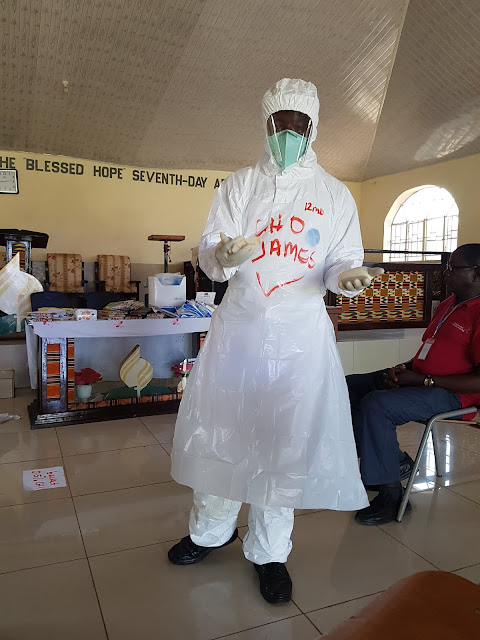There are things in Sierra Leone that are starting to seem normal, but when we say them out loud it sounds ridiculous. I want to compile a few of those stories here.
The first is a story from Rachel. During COVID all of the outpatient services were constrained to one room in one building: Registration, Payment, Consultation, Minor Procedures and dressing changes, etc. There’s basically no privacy as every section is just separated by fabric curtains. A patient came in with a large laceration on her leg from falling in the market onto some exposed rebar. It became infected and she had to come back daily for dressing changes and wound care. Sometimes she would be screaming so loud with the dressing changes that we’d have to shout to hear our clinic patients. But nobody seemed to mind.
We use honey dressings for their antibacterial properties and this woman really needed it. They keep the honey in a plastic water bottle, but this bottle was running low. Since everyone pitches in, a lady from accounts grabbed the 20L container that we store the extra honey in. She used a scoop to fill up the small water bottle and handed it to the nurse. I watched as the nurse applied the honey to the patient’s wound. But when I looked to my left, there was the lady from accounts, standing right next to the patient, licking the honey from the scoop! (Why waste honey??) Can you imagine being a patient and watching someone eat the very thing a nurse is putting directly into your wound?!
Another instance is regarding our night security, Pa Brima. This guy works very hard. He has both day and night jobs most of the time. When he comes for his shift at our house, he usually changes clothes into something more comfortable for the evening that he doesn’t mind if they get dirty. One night we have other Americans coming over for dinner. As is usual, we decided a time for them to arrive. When Brima came for the evening, I warned him that they were coming at 7 PM. The appointed time comes and I hear a honk at the gate. I go outside and I see Brima opening the gate for the car. His shirt is half pulled on and wadded up around his nipples; thankfully his undershirt was properly positioned. He doesn’t have any pants and is wearing only boxers. Everyone gets out of the car and happily greet him because they know him from another job. Then we all go into the house. Nobody mentions it. It’s somehow normal for our security to be half dressed.
Lastly, a story from a patient in the ward. On one of our mobile clinics, John Max Conteh (one of the midlevel providers, a CHO), saw a child who was 7 months old and weighed less than 3 kg (6.5 lbs). This is the most malnourished child I’ve ever seen. This child’s name is Neneh (a girl’s name) even though he is a boy. The mother had so many baby boys die, that when she saw this one was a boy she gave it a girl’s name in hopes that whatever killed the others wouldn’t effect this baby. I sat next to the woman and baby on the bed and facing us was the husband sitting on another bed. I was asking them questions about their living situation, their other children, this child’s birth, etc. I asked if the mother was breast feeding and she was. I asked if she was making much milk and instead of answering the question, she just pulled her breast out of her shirt and squeezed it. Breast milk came out more like water than milk because of her malnutrition. But when she squeezed it flew out and sprayed all over her husband who was sitting directly across from us! I was the only one who was surprised by this, everyone else carried on the conversation as normal. “See, she’s making milk.”
Anywhere you live, life can be sad and life can be strange. But the longer you hang around, the more normal things seem. I think this is how cultural blind spots are formed. But for now, I still relish the cartoonish absurdity of daily life.
















